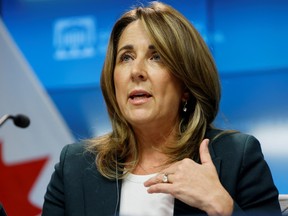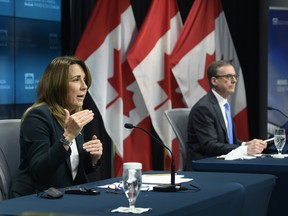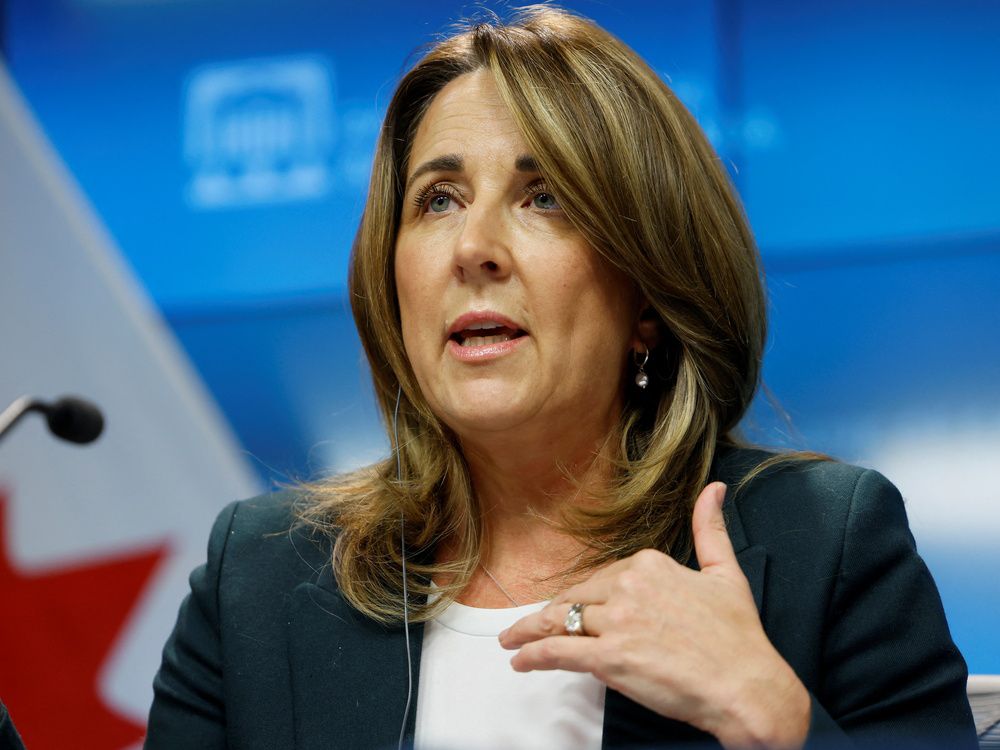Its reputation under pressure as politicians such as Pierre Poilievre question independence, commitment to inflation mandate

Article content
Senior deputy governor Carolyn Rogers re-affirmed the Bank of Canada’s independence from the federal government in her first speech since taking the second-in-command post at the country’s central bank.
Advertisement 2
Article content
In a speech before the Women in Capital Markets in Toronto on May 3, Rogers also emphasized trust and credibility in the central bank as being vitally important during the pandemic and vowed to keep this trust moving forward.
“We talk about things that can seem abstract to most people — growth, output, productivity,” Rogers said. “And our decisions take time and have to work through other parts of the economy before they directly affect Canadians. We can seem a little mysterious.
“But mysterious is not what we’re aiming for,” she added. “What we’re aiming for is trust.”
The central bank’s reputation has come under pressure in recent months as politicians such as Conservative leadership candidate Pierre Poilievre question its independence from Prime Minister Justin Trudeau’s government and its commitment to its mandate to control inflation. Poilievre, who is seen as the frontrunner to be the next Opposition leader, said last month that he would audit the institution if he becomes prime minister.
Advertisement 3
Article content
Canadians have also been feeling the bite of rampant inflation, which ran at its fastest pace in 31 years with a 6.7 per cent reading in March. Higher costs of everything from gasoline to groceries have been adding more angst among Canadians.
What we’re aiming for is trust
Carolyn Rogers
“We are acutely aware that, with some of the extraordinary actions we have taken during the pandemic and with inflation well above our target, some people are questioning that trust,” Rogers said, adding that she welcomes tough questions and scrutiny as an opportunity to engage with Canadians on these concerns.
Rogers also pointed to the Bank of Canada Act, a measure created in 1934 to establish the central bank as an independent Crown corporation that sets out its own powers as they relate to monetary policy and financial stability, as a reason the public can trust policymakers to work at arm’s length from politicians.
Advertisement 4
Article content
It’s an act that has evolved over the years, with one notable change being the first-ever inflation-targeting agreement in 1991. Since then, there has been a contract between the central bank and the federal government that would set up an inflation target, though it would ultimately grant the central bank the means to achieve the target of two per cent.

Volatile inflation through the 1970’s and ‘80s, which saw inflation whipsawing from six per cent to over 12 per cent, was the impetus of establishing this target.
One detail in the legislation states that if the finance minister and the governor of the Bank of Canada ever reached a disagreement on monetary policy, the minister would have the power to issue a directive to the central bank that would be tabled in Parliament after receiving approval from the governor and cabinet. It’s a measure that has never been used, a fact that Rogers attributed to the central bank’s track record and the respect governments have put in the institution’s independence.
Advertisement 5
Article content
Fast forward to the onset of the COVID-19 pandemic, and the bank has been put through the test of providing monetary support to the financial system through its quantitative easing program. Rogers emphasized that these asset purchase programs and balance sheet holdings are publicly available, which she said was designed to ensure the public could follow along with the central bank.
-

Tiff Macklem acknowledges misjudging inflation, pledges to act ‘forcefully’ to bring it down
-

Macklem hints at a second half-point rate hike, while dousing talk he could go bigger
-

Bank of Canada might pull off a soft landing, but it won’t be easy
-

Tiff Macklem acknowledges inflation is running hotter than expected
As the country emerges from the worst of the pandemic, the Bank of Canada’s next act will be to tamp down rampant inflation, which governor Tiff Macklem recently acknowledged had been misjudged in light of the conflict in Europe.
Rogers echoed this acknowledgement, saying the Russian invasion into Ukraine and commodities rally that followed caught the central bank by surprise. That said, she insisted the bank was ready to act to bring the economy back to balance and the public’s trust back with it.
“There is still work to do. The job is not complete,” Rogers said. “We will continue to focus on building and maintaining the trust of Canadians, and we know Canadians will continue to hold us to account.”
• Email: shughes@postmedia.com | Twitter: StephHughes95


